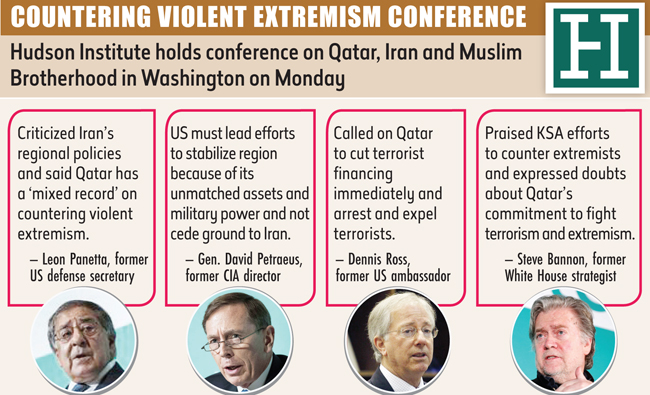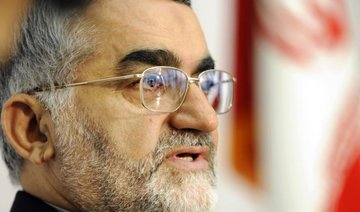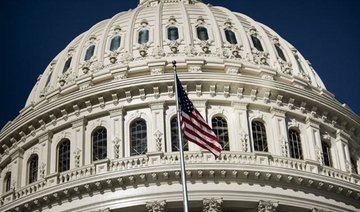WASHINGTON: The Washington-based, conservative-leaning Hudson Institute organized a conference called “Countering Violent Extremism: Qatar, Iran and the Muslim Brotherhood” on Monday.
The five-hour long event featured a host of speakers voicing their concerns over both Iran’s and Qatar’s regional policies, including senior members of the US Congress, retired officials from previous Republican and Democratic administrations, and several scholars and analysts from other think tanks in Washington.
The event’s three keynote speakers were former Secretary of Defense Leon Panetta, former Director of the Central Intelligence Agency and retired Gen. David Petraeus, and former White House Chief Strategist Steve Bannon, the executive chairman of far-right website Breitbart News.
The speakers were near-unanimous in their condemnation of Iran’s destabilizing policies in the Middle East, and most also expressed serious concerns about what they deemed to be Qatar’s attempt to “play both sides of the street” and its reluctance to sever ties with various militant and terrorist organizations across the region.
The participants also strongly criticized the Muslim Brotherhood and its various affiliates across the region, particularly the Palestinian militant group Hamas.
In his speech to open the conference, Panetta warned that the world is currently witnessing more “flashpoints” than at any other time since the end of World War II. He stressed the importance of “keeping your word,” arguing that the previous US administration of President Barack Obama lost credibility when it failed to enforce its self-imposed “red line” against the use of chemical weapons in Syria.
To avoid this mistake, the Trump administration should adhere to the agreement the US signed with Iran over its nuclear energy program, Panetta argued.
While strongly criticizing Iran’s policies in the region, Panetta also concluded that Qatar had a “mixed record” in terms of countering violent extremism.
In a free-flowing conversation with former US Ambassador Dennis Ross, Petraeus maintained that the international community in general, and the US in particular, is locked in a “generational struggle” with extremists.
Petraeus warned against ceding ground to Iran, which he argued has a proclivity to “exploit ungoverned places.” The former general made an impassioned plea for the US to lead efforts to stabilize the region, because of its unmatched assets and military power.
For his part, Ross called on Qatar to implement measures to cut terrorist financing immediately, adding that the Qatari government should arrest or expel any person designated as a terrorist by the US.

During his speech, Bannon called the situation in Qatar the “most important thing in the world.” He described the demands of the Anti-Terror Quartet — Saudi Arabia, the UAE, Bahrain and Egypt — as reasonable and “straightforward.”
Bannon praised Saudi Arabia’s Vision 2030 package of economic reforms and its efforts to counter extremism. He singled out May’s Riyadh Summit — President Donald Trump’s first overseas trip — as a landmark event that set the region on a new trajectory, particularly in relation to ending the financing of terrorist groups.
Like several other speakers, Bannon referred to Saudi Arabia as a friend of the US, but expressed serious doubts about Qatar’s commitment to fighting extremism and terrorism.
Brad Sherman, the second-ranked Democrat in the US House Foreign Affairs Committee, joked that Qatar’s attempts to align with the US and its Arabian Gulf allies while continuing to support militant groups like the Muslim Brotherhood, were akin to “performing political gymnastics.”
Among other notable speakers at the conference were Ed Royce, chairman of the US House Foreign Affairs Committee, and Tom Cotton, a Republican senator from Arkansas.
Royce characterized Qatar’s record on countering violent extremism as “disturbing.”
Cotton described Qatar’s behavior as “unhelpful” and called on it to end its support of the Muslim Brotherhood and to recall its ambassador from Iran.


























